 HOME
- EXHIBITION OVERVIEW
HOME
- EXHIBITION OVERVIEW
SECTIONS:
I. America as Refuge -
II. 18th Century America
III. American Revolution -
IV. Congress of the Confederation -
V. State Governments
VI. Federal Government -
VII. New Republic

V. Religion and the State Governments
Many states were as explicit
about the need for a thriving religion as Congress was in its
thanksgiving and fast day proclamations. The Massachusetts Constitution of 1780 declared,
for example, that "the happiness of a people, and the good order and preservation of civil
government, essentially depend on piety, religion and morality." The states were in a stronger
position to act upon this conviction because they were considered to possess "general" powers
as opposed to the limited, specifically enumerated powers of Congress.
Congregationalists and Anglicans who, before 1776, had received public financial
support, called their state benefactors "nursing fathers" (Isaiah 49:23). After independence
they urged the state governments, as "nursing fathers," to continue succoring them. Knowing
that in the egalitarian, post-independence era, the public would no longer permit single
denominations to monopolize state support, legislators devised "general assessment schemes."
Religious taxes were laid on all citizens, each of whom was given the option of designating his
share to the church of his choice. Such laws took effect in Massachusetts, Connecticut, and
New Hampshire and were passed but not implemented in Maryland and Georgia.
After a general assessment scheme was defeated in Virginia, an incongruous coalition
of Baptists and theological liberals united to sunder state from church. However, the outcome
in Virginia of the state-church debate did not, it should be remembered, represent the views of
the majority of American states that wrestled with this issue in the 1780s.

"NURSING FATHERS" OF THE CHURCH
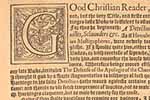 Queen Elizabeth I as Nursing Mother to the Church
Queen Elizabeth I as Nursing Mother to the Church
John Jewel, Bishop of Salisbury (1522-1571), has been called the "father of the Church of
England," because his tract, The Apologie of the Church of England (London, 1562), was
"the first methodical statement of the position of the Church of England against the Church of
Rome." Jewel's Apologie was attacked by Catholic spokesmen, eliciting from him the Defense
of his original publication, seen here, in which he saluted Queen Elizabeth, using Isaiah's
metaphor, as the "Nource" of the church.
A Defense of the Apologie of the Churche of Englande
John Jewel , London: Henry Wykes, 1570
Rare Book and Special Collections Division,
Library of Congress (121)
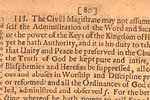 The Westminster Confession of Faith
The Westminster Confession of Faith
The Westminster Confession of Faith, the "creed" of the Presbyterian Church in Scotland and
the American colonies, was drafted by a convention of ministers summoned by the Long
Parliament in 1643. In the revised creed, adopted by the Presbyterian Church in the United
States in 1788, "nursing fathers" was elevated from an explanatory footnote--(note f), as it
appears here, to the body of the text in the section on the duties of the civil magistrate. The
concept of the state as a nursing father provided the theological justification for some
American Presbyterians to approve the idea of state financial support for religion.
The Humble Advice of the Assembly of Divines
by Authority of Parliament sitting at
Westminster;
Concerning a Confession of Faith
London: S. Griffin, 1658
Rare Book and Special Collections Division,
Library of Congress (122)
|
During the debates in the 1780s about the propriety of providing financial support to the
churches, those who favored state patronage of religion urged their legislators, in the words of
petitioners from Amherst County, Virginia, in 1783, not "to think it beneath your Dignity to
become Nursing Fathers of the Church." This idea was an old one, stretching back to the
dawn of the Reformation. The term itself was drawn from Isaiah 49:23, in which the prophet
commanded that "kings shall be thy nursing fathers, and their queens thy nursing mothers."
The responsibilities of the state were understood in an early work like Bishop John
Jewel's Apologie of the Church of England (1562) to be comprehensive, including imposing
the church's doctrine on society. The term "nursing father" was used in all American colonies
with established churches. It appeared in the Cambridge Platform of 1648, the "creed" of
New England Congregationalism; in numerous Anglican writings; and in the Presbyterian
Westminster Confession. By the time of the American Revolution, the state was no longer
expected to maintain religious uniformity in its jurisdiction, but it was expected to use its
resources for the churches' benefit.
|
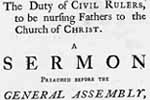 Civil Rulers as Nursing Fathers
Civil Rulers as Nursing Fathers
This is one of the many public statements in New England of the "nursing fathers" concept.
After independence the phrase was sometimes modified to "political fathers."
The Duty of Civil Rulers, to be nursing Fathers to the Church of Christ. A Sermon. . . .
Edward Dorr, Hartford: Thomas Green, 1765
Rare Book and Special Collections Division, Library of Congress (123)
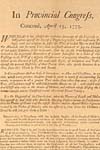 British Government as Nursing Fathers
British Government as Nursing Fathers
In this proclamation, the British government was reproved for not supporting the church in
Massachusetts: "those who should be Nursing Fathers become its Persecutors."
Fast Day Proclamation, April 15, 1775
Massachusetts Provincial Congress, Broadside
Rare Book and Special Collections Division, Library of Congress (124)
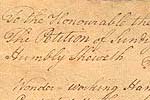 The Virginia Assembly as Nursing Fathers
The Virginia Assembly as Nursing Fathers
This petition asks that members of the Virginia Assembly play their traditional role as
"Nursing Fathers" of the church.
Petition to the Virginia Assembly from Amherst County,
Virginia, November 27, 1783 [page one] -
[page two] -
[page three] -
[page four]
The Library of Virginia (125)
|

THE CHURCH-STATE DEBATE: MASSACHUSETTS
|
After independence the American states were obliged to write constitutions establishing how
each would be governed. In no place was the process more difficult than in Massachusetts.
For three years, from 1778 to 1780, the political energies of the state were absorbed in
drafting a charter of government that the voters would accept. A constitution prepared in 1778
was decisively defeated in a public referendum. A new convention convened in 1779 to make
another attempt at writing an acceptable draft.
One of the most contentious issues was
whether the state would support religion financially. Advocating such a policy--on the
grounds that religion was necessary for public happiness, prosperity, and order--were the
ministers and most members of the Congregational Church, which had been established, and
hence had received public financial support, during the colonial period. The Baptists, who had
grown strong since the Great Awakening, tenaciously adhered to their ancient conviction that
churches should receive no support from the state. They believed that the Divine Truth,
having been freely received, should be freely given by Gospel ministers.
The Constitutional
Convention chose to act as nursing fathers of the church and included in the draft constitution
submitted to the voters the famous Article Three, which authorized a general religious tax to
be directed to the church of a taxpayers' choice. Despite substantial doubt that Article Three
had been approved by the required two thirds of the voters, in 1780 Massachusetts authorities
declared it and the rest of the state constitution to have been duly adopted.
|
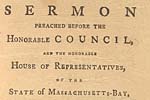 For Tax-Supported Religion
For Tax-Supported Religion
Phillips Payson (1736-1801), Congregational minister at Chelsea, was a pillar of the
established church in Massachusetts. Payson was widely admired for leading an armed group
of parishioners into battle at Lexington in 1775. In this Election Sermon, Payson used an
argument that was a staple of the Massachusetts advocates of state support of religion, insisting
that "the importance of religion to civil society and government is great indeed . . . the fear
and reverence of God and the terrors of eternity, are the most powerful restraints on the minds
of men . . . let the restraints of religion once be broken down . . . and one might well defy all
human wisdom and power to support and preserve order and government in the state."
A sermon preached before the honorable Council,
and the honorable House of Representatives,
of the State of Massachusetts-Bay, in New-England,
at Boston, May 27, 1778
Phillips Payson, Boston: John Gill, 1778
Rare Book and Special Collections Division,
Library of Congress (126)
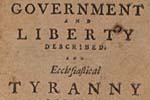 Against Tax-Supported Religion
Against Tax-Supported Religion
Isaac Backus (1724-1806) was the leader of the New England Baptists. In this response to
Payson's Election Sermon, Backus forcefully states the Baptists' opposition to state support of
the churches. This opposition was grounded in the Baptists' reading of the New Testament
and also of ecclesiastical history which demonstrated, that state support of religion inevitably
corrupted the churches. Backus and other Baptist leaders agreed with their clerical adversaries
in believing that religion was necessary for social prosperity and happiness but they believed
that the best way for the state to assure the health of religion was to leave it alone and let it
take its own course, which, the Baptists were convinced, would result in vital, evangelical
religion covering the land.
Government and Liberty Described
and Ecclesiastical Tyranny Exposed
Isaac Backus, Boston: Powars and Willis, 1778
Courtesy of the John Carter Brown Library,
Brown University (127)
|
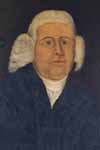
Rev. Isaac Baccus, AM.
Trask Library, Andover Theological Seminary,
Newton Centre, Massachusetts (128)
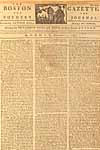 Another Advocate of Tax-Supported Religion
Another Advocate of Tax-Supported Religion
In Massachusetts, a newspaper war raged for years over state support of religion. One of the
most indefatigable combatants on the side of state support was Samuel West (1730-1807),
Congregational minister at Dartmouth, Massachusetts, who performed valuable code-breaking
services for the American Army during the Revolutionary War. Here West, writing as
"Irenaeus," uses the familiar argument that religion with its "doctrine of a future state of
reward and punishment" provides a greater inducement to obedience to the law than civil
punishments. It is, as a result, so indispensable for the maintenance of social order that its
support must be assured by the state, not left to private initiative.
The Boston Gazette and the Country Journal, November 27, 1780.
"Irenaeus"
Serial and Government Publications Division, Library of Congress (129)
![A Declaration of the Rights of the Inhabitants of the Commonwealth of Massachusetts [right page]](f0503bth.jpg)
![A Declaration of the Rights of the Inhabitants of the Commonwealth of Massachusetts [left page]](f0503ath.jpg) Massachusetts Constitution of 1780 Massachusetts Constitution of 1780
Article Three of the Bill of Rights of the Massachusetts Constitution of 1780 asserted that "the
happiness of a people, and the good order and preservation of civil government, essentially
depend on piety, religion and morality."
A Declaration of the Rights of the Inhabitants of the Commonwealth of Massachusetts
from Account of Frame of Government agreed upon
by the Delegates of the People. . . .[left page] -
[right page]
Boston: Benjamin Edes & Sons, 1780. Copyprints
Rare Book and Special Collections
Division, Library of Congress (130-130a )
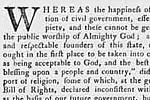 An Appeal for Tax-Supported Religion in Maryland
An Appeal for Tax-Supported Religion in Maryland
An example of the influence of Article Three of the Massachusetts Constitution is this
broadside issued by the Maryland House of Delegates in 1785 as part of a campaign to win
public support for a general religious tax. The first sentence of this broadside paraphrases
Article Three.
Proposed Resolution of the Maryland House of Delegates.
Broadside, January 12, 1785
Broadside Collection, Rare Book and Special Collections Division, Library of Congress (131)
|

THE CHURCH-STATE DEBATE: VIRGINIA
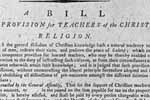 A Proposal for Tax-Supported Religion for Virginia
A Proposal for Tax-Supported Religion for Virginia
This broadside contains (at the bottom) the opening sections of Patrick Henry's general
assessment bill, one similar to those passed in the New England states. The bill levied a tax
for the support of religion but permitted individuals to earmark their taxes for the church of
their choice. At the top of the broadside are the results of a vote in the Virginia General
Assembly to postpone consideration of the bill until the fall 1785 session of the legislature.
Postponing the bill allowed opponents to mobilize and defeat it. Leading the forces for
postponement was James Madison. Voting against postponement and, therefore, in support of
a general tax for religion was the future Chief Justice of the United States, John Marshall.
A Bill Establishing a Provision for Teachers
of the Christian Religion, Patrick Henry,
Virginia House of Delegates, December 24, 1784. Broadside
Manuscript Division, Library of Congress (133)
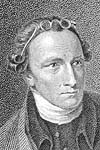 Patrick Henry
Patrick Henry
Stipple engraving by Leney, after Thomas Sully
Published by J. Webster, 1817, Copyprint
Prints and Photographs Division
(LC-USZ62-4907)
Library of Congress (134)
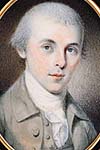 James Madison
James Madison
Miniature portrait by Charles Willson Peale, 1783
Rare Book and Special Collections Division
(USZ62-5310)
Library of Congress (135)
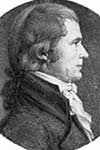 John Marshall
John Marshall
Engraving with ink and ink wash, by Charles-Balthazar-Julien
Fevret de Saint-Mémin, 1808
Prints and Photographs Division
(LC-USZ62-54940)
Library of Congress (136)
|
In 1779 the Virginia Assembly deprived Church of England ministers of tax support. Patrick
Henry sponsored a bill for a general religious assessment in 1784. He appeared to be on the
verge of securing its passage when his opponents neutralized his political influence by electing
him governor. As a result, legislative consideration of Henry's bill was postponed until the
fall of 1785, giving its adversaries an opportunity to mobilize public opposition to it.
Arguments used in Virginia were similar to those that had been employed in
Massachusetts a few years earlier. Proponents of a general religious tax, principally
Anglicans, urged that it should be supported on "Principles of Public Utility" because
Christianity offered the "best means of promoting Virtue, Peace, and Prosperity." Opponents
were led by Baptists, supported by Presbyterians (some of whom vacillated on the issue), and
theological liberals. As in Massachusetts, they argued that government support of religion
corrupted it. Virginians also made a strong libertarian case that government involvement in
religion violated a people's civil and natural rights.
James Madison, the leading opponent of
government-supported religion, combined both arguments in his celebrated Memorial and
Remonstrance. In the fall of 1785, Madison marshaled sufficient legislative support to
administer a decisive defeat to the effort to levy religious taxes. In place of Henry's bill,
Madison and his allies passed in January 1786 Thomas Jefferson's famous Act for Establishing
Religious Freedom, which brought the debate in Virginia to a close by severing, once and for
all, the links between government and religion.
|
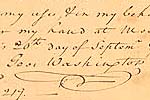 George Washington in Support of Tax-Supported Religion
George Washington in Support of Tax-Supported Religion
In this letter George Washington informs his friend and neighbor, George Mason, in the midst
of the public agitation over Patrick Henry's general assessment bill, that he does not, in
principle, oppose "making people pay towards the support of that which they profess,"
although he considers it "impolitic" to pass a measure that will disturb public tranquility.
George Washington to George Mason, October 3, 1785
Manuscript copy, Letterbook 1785-1786
Manuscript Division, Library of Congress (137)
![Richard Henry Lee to James Madison, November 26, 1784 [page one]](vc6649th.jpg) Another Supporter of Tax-Supported Religion
Another Supporter of Tax-Supported Religion
Richard Henry Lee, who moved in the Continental Congress, June 7, 1776, that the United
States declare its independence from Britain, supported Patrick Henry's bill because he
believed that the influence of religion was the surest means of creating the virtuous citizens
needed to make a republican government work. His remark that "refiners may weave as fine a
web of reason as they please, but the experience of all times shows religion to be the guardian
of morals" appears to be aimed at Thomas Jefferson who, at this point in his career, was
thought by other Virginians to believe that sufficient republican morality could be instilled in
the citizenry by instructing it solely in history and the classics.
Richard Henry Lee to James Madison, November 26, 1784
[page one] -
[page two] -
[page three] -
[page four]
Manuscript letter
Manuscript Division, Library of Congress (143)
![Petition to the Virginia General Assembly, from Surry County, Virginia, November 14, 1785 [page one]](vc6692th.jpg) An Appeal for Tax-Supported Religion
An Appeal for Tax-Supported Religion
The debate in Virginia in 1785 over religious taxation produced an unprecedented outpouring
of petitions to the General Assembly. This petition from supporters of Patrick Henry's bill in
Surry County declares that "the Christian Religion is conducive to the happiness of Societies."
They assert that "True Religion is most friendly to social and political Happiness--That a
conscientious Regard to the approbation of Almighty God lays the most effectual restraint on
the vicious passions of Mankind affords the most powerful incentive to the faithful discharge
of every social Duty and is consequently the most solid Basis of private and public Virtue is a
truth which has in some measure been acknowledged at every Period of Time and in every
Corner of the Globe."
Petition to the Virginia General Assembly, from Surry County, Virginia, November 14, 1785
[page one] -
[page two] -
[page three] -
[page four] -
[page five]
Manuscript
The Library of Virginia (138)
|

PERSECUTION IN VIRGINIA
|
In Virginia, religious persecution, directed at Baptists and, to a lesser degree, at Presbyterians,
continued after the Declaration of Independence. The perpetrators were members of the
Church of England, sometimes acting as vigilantes but often operating in tandem with local
authorities. Physical violence was usually reserved for Baptists, against whom there was
social as well as theological animosity. A notorious instance of abuse in 1771 of a well-known
Baptist preacher, "Swearin Jack" Waller, was described by the victim: "The Parson of the
Parish [accompanied by the local sheriff] would keep running the end of his horsewhip in
[Waller's] mouth, laying his whip across the hymn book, etc. When done singing [Waller]
proceeded to prayer. In it he was violently jerked off the stage; they caught him by the back
part of his neck, beat his head against the ground, sometimes up and sometimes down, they
carried him through the gate . . . where a gentleman [the sheriff] gave him . . . twenty lashes
with his horsewhip."
The persecution of Baptists made a strong, negative impression on many patriot
leaders, whose loyalty to principles of civil liberty exceeded their loyalty to the Church of
England in which they were raised. James Madison was not the only patriot to despair, as he
did in 1774, that the "diabolical Hell conceived principle of persecution rages" in his native
colony. Accordingly, civil libertarians like James Madison and Thomas Jefferson joined
Baptists and Presbyterians to defeat the campaign for state financial involvement in religion in
Virginia.
|
![Summons to Nathaniel Saunders, August 22, 1772 [cover]](vc6697th.jpg) Unlawful Preaching
Unlawful Preaching
Many Baptist ministers refused on principle to apply to local authorities for a license to
preach, as Virginia law required, for they considered it intolerable to ask another man's
permission to preach the Gospel. As a result, they exposed themselves to arrest for "unlawfull
Preaching," as Nathaniel Saunders (1735-1808) allegedly had done. Saunders, at this time,
was the minister of the Mountain Run Baptist Church in Orange County, Virginia.
![Summons to Nathaniel Saunders, August 22, 1772 [summons]](vc6698th.jpg)
Summons to Nathaniel Saunders, August 22, 1772 [cover] -
[summons]
Manuscript
Virginia Baptist Historical Society (140)
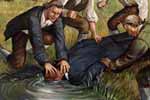
Dunking of Baptist Ministers
David Barrow was pastor of the Mill Swamp Baptist Church in the Portsmouth, Virginia, area.
He and a "ministering brother," Edward Mintz, were conducting a service in 1778, when they
were attacked. "As soon as the hymn was given out, a gang of well-dressed men came up to
the stage . . . and sang one of their obscene songs. Then they took to plunge both of the
preachers. They plunged Mr. Barrow twice, pressing him into the mud, holding him down,
nearly succeeding in drowning him . . . His companion was plunged but once . . . Before
these persecuted men could change their clothes they were dragged from the house, and driven
off by these enraged churchmen."
The Dunking of David Barrow and Edward Mintz in the Nansemond River, 1778
Oil on canvas by Sidney King, 1990
Virginia Baptist Historical Society (141)
|
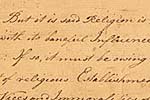 Petition Against Religious Taxation
Petition Against Religious Taxation
This anti-religious tax petition (below), composed, scholars have assumed, by a Baptist and
clearly stating the Baptist point of view, was printed in large numbers and circulated
throughout central and southern Virginia. It was signed by more citizens than any other
document opposing Patrick Henry's bill, including James Madison's more famous Memorial
and Remonstrance. What distinguished this petition from others was its strong evangelical
flavor. It argued that deism, which many of the temporary allies of the Baptists espoused,
could be "put to open shame" by the exertions of preachers who were "inwardly moved by the
Holy Ghost." It also presented the Baptist reading of history, namely, that the state ruined,
rather than helped, religion by supporting it.
Petition to the Virginia General Assembly, Westmoreland County,
Virginia, November 27, 1785 [left page] -
[right page]
The Library of Virginia (139)
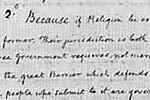 Madison's Memorial and Remonstrance
Madison's Memorial and Remonstrance
Madison's principal written contribution to the contest over Henry's general assessment bill
was his Memorial and Remonstrance. Madison's petition has grown in stature over time and
is now regarded as one of the most significant American statements on the issue of the
relationship of government to religion. Madison grounded his objection to Henry's bill on the
civil libertarian argument that it violated the citizen's "unalienable" natural right to freedom of
religion and on the practical argument that government's embrace of religion had inevitably
harmed it. Thus, he combined and integrated the two principal arguments used by opponents
of Henry's bill.
To the Honorable the General Assembly
of the Commonwealth of Virginia:
A Memorial and Remonstrance
Holograph manuscript, June 1785
James Madison
Manuscript Division, Library of Congress (142)
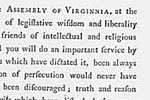 Jefferson's Act for Establishing Religious Freedom
Jefferson's Act for Establishing Religious Freedom
This act, the title of which Jefferson directed to be inscribed on his tombstone as comparable
in importance to the Declaration of Independence, does not exist in a handwritten copy. The
version shown here was printed as a broadside in London in 1786 by the great civil libertarian
and friend of America, Dr. Richard Price, who wrote the introduction and made changes in
the text. Jefferson evidently wrote the Bill for Establishing Religious Freedom in 1777 as a
part of his project to revise the laws of his state. The Bill was debated in the General
Assembly in 1779 and was postponed after passing a second reading. Madison revived it as an
alternative to Henry's general assessment bill and guided it to passage in the Virginia
Assembly in January 1786.
An Act for Establishing Religious Freedom, January 1786.
Thomas Jefferson, Laidler, July 1786.
Broadside
Rare Book and Special Collections Division,
Library of Congress (144) |
 HOME -
EXHIBITION OVERVIEW
HOME -
EXHIBITION OVERVIEW
SECTIONS:
I. America as Refuge -
II. 18th Century America
III. American Revolution -
IV. Congress of the Confederation -
V. State Governments
VI. Federal Government -
VII. New Republic

|

 Queen Elizabeth I as Nursing Mother to the Church
Queen Elizabeth I as Nursing Mother to the Church The Westminster Confession of Faith
The Westminster Confession of Faith Civil Rulers as Nursing Fathers
Civil Rulers as Nursing Fathers British Government as Nursing Fathers
British Government as Nursing Fathers The Virginia Assembly as Nursing Fathers
The Virginia Assembly as Nursing Fathers For Tax-Supported Religion
For Tax-Supported Religion Against Tax-Supported Religion
Against Tax-Supported Religion
 Another Advocate of Tax-Supported Religion
Another Advocate of Tax-Supported Religion![A Declaration of the Rights of the Inhabitants of the Commonwealth of Massachusetts [right page]](f0503bth.jpg)
![A Declaration of the Rights of the Inhabitants of the Commonwealth of Massachusetts [left page]](f0503ath.jpg) Massachusetts Constitution of 1780
Massachusetts Constitution of 1780 An Appeal for Tax-Supported Religion in Maryland
An Appeal for Tax-Supported Religion in Maryland A Proposal for Tax-Supported Religion for Virginia
A Proposal for Tax-Supported Religion for Virginia Patrick Henry
Patrick Henry James Madison
James Madison John Marshall
John Marshall George Washington in Support of Tax-Supported Religion
George Washington in Support of Tax-Supported Religion![Richard Henry Lee to James Madison, November 26, 1784 [page one]](vc6649th.jpg) Another Supporter of Tax-Supported Religion
Another Supporter of Tax-Supported Religion![Petition to the Virginia General Assembly, from Surry County, Virginia, November 14, 1785 [page one]](vc6692th.jpg) An Appeal for Tax-Supported Religion
An Appeal for Tax-Supported Religion![Summons to Nathaniel Saunders, August 22, 1772 [cover]](vc6697th.jpg) Unlawful Preaching
Unlawful Preaching![Summons to Nathaniel Saunders, August 22, 1772 [summons]](vc6698th.jpg)

 Petition Against Religious Taxation
Petition Against Religious Taxation Madison's Memorial and Remonstrance
Madison's Memorial and Remonstrance Jefferson's Act for Establishing Religious Freedom
Jefferson's Act for Establishing Religious Freedom